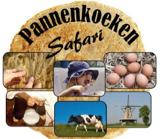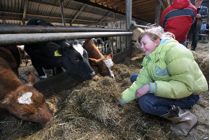Food education in primary schools and afterschool day care (age 4-12)
May 28, 2013
Contributor: Anne de Feijter, Amersfoort
Workshop: Resource efficiency – CO2 reduction / What key behavioural changes to promote to effectively lessen footprint?
All year round primary schools and afterschool day care organizations can participate in projects that educate children from 4 till 12 years old about the origin of their food. These activities are being organized by the municipality: Centre of Nature and Environmental Education (CNME) and by One Planet, a local non-profit foundation.


The main goal is to educate children about the origin of the ingredients of their meals. Where does the milk comes from? How does vegetables grow? Etc.
Other goals:
- To teach children about healthy food/a healthy diet.
- To teach children about organic food and about regional products.
- To make children aware of the sustainable factors concerning food (producing, transportation, preparing, etc.).
- To make children aware of the choices they can make in their daily lives concerning food.
All year round primary schools and afterschool day care organisations can participate in different projects that educate children (from 4 till 12 years old) about the origin of their food. These activities are being organized by the municipality: Centre of Nature and Environmental Education (CNME) and by One Planet, a local non-profit foundation.
The different projects are:
- ‘Pannenkoekensafari’ (= Pancake Safari) in which children visit a local farmer and a mill to get the ingredients to bake their own pancakes. One Planet organises this excursion when a request comes from a school or day care. One Planet is a local, non-profit foundation focusing on sustainability issues. This safari takes a whole day and costs € 400,- a group. See the film: http://www.youtube.com/watch?v=KMm4Ab9KulE.
- Farm education for primary schools: ‘Boer Teun en zijn koeien’ (= Farmer Teun and his cows) and ‘De winkel van Boerin Brenda’ (= The farm shop of Brenda). These are projects in which children take active part in a story about a farmer. Several lessons are integrated in this story. A visit to a local farm is included.
26 school classes participate in school year 2012-2013. Costs: € 125,- for a 1,5 hour visit at the farm.
- De boer op!’ (= Let’s go to the farm!) is a farm excursion for afterschool day care organizations. In this excursion recreation (having fun at the farm) and learning is combined. Children visit the milking robot, meet the calves and work in the stables.
About 8 groups have booked an excursion in 2013. Costs: € 150,- for a 2 hours visit at the farm.
- Educational toolboxes for primary schools and afterschool day care: ‘Kaas maken’ (= Making cheese) and ‘Alles voor een pannenkoek’ (= All you need for a pancake) to work with on their own locations.
These toolboxes are being lend out to schools/day care 46 times during the school year 2012-2013. Costs are € 4,- for a period of 2,5 weeks. (Often more than one group work with the toolbox within this period.)
- ‘Smaaklessen’ (= Taste Lessons) is a nationwide project for children in which they learn to taste unknown food, experience different tastes, compare organic and non-organic vegetables, etc. It is available for primary schools and afterschool day care organizations. http://www.smaaklessen.nl/
Benefits (environmental/social/economical…)
In these project children become aware of the choices they can make in their daily lives, concerning food consumption. They talk about this with their parents (spin-off).
Pro: Many children visit a farm for the first time in their lives during one of these projects. They get a good picture of how a farm works, where the milk comes from and which route the milk travels from the cow to the fridge at a child’s home.
The projects are being developed by education professionals. Children not only go to the farm to just have a general look around. They prepare their visit at school (introduction lessons, formulate questions for the farmer, what is it you want to know about a farm?, how do you think a farm works, etc.), they play an active role during the visit at the farm and back at school they prepare a presentation for parents about farm life and the products that are made at a farm.
Contra: Projects in which children visit a farm are not for free. The farmer gets payed a reasonable fine for his/her time to host the group. Prices are varying from € 125,- (for a 1,5 hour visit) to € 400,- for a whole day (Pannenkoekensafari). Not every primary school or day care chooses to pay this.
Good relationships with both schools and day care organizations and local farmers are crucial in the success of these projects. Farmers that want to participate in education need to follow a training, given by a professional foundation that focuses on agricultural education, in order to get a certificate. Aspects of hygiene, accommodation (toilets, reception room, etc.), first aid, etc. are part of this training.
How can we make these projects accessible (in price) for all schools and day care organizations?